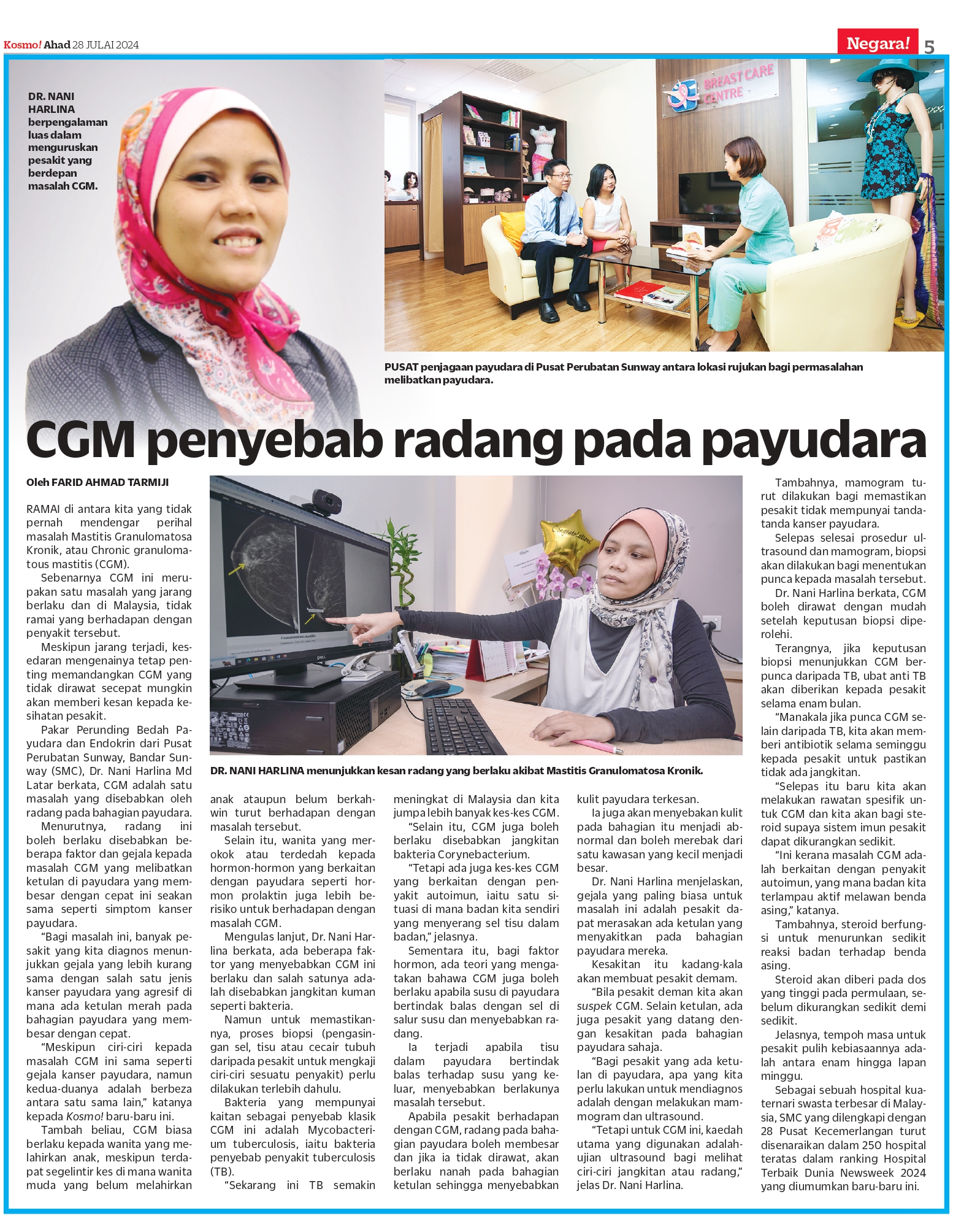CGM Causes Breast Inflammation
28 July 2024
 Many of us may have heard of Chronic Granulomatous Mastitis (CGM). In fact, CGM is a relatively rare condition, and not many people in Malaysia encounter this illness. Although it is uncommon, awareness of it is crucial since untreated CGM can significantly impact a patient's health.
Many of us may have heard of Chronic Granulomatous Mastitis (CGM). In fact, CGM is a relatively rare condition, and not many people in Malaysia encounter this illness. Although it is uncommon, awareness of it is crucial since untreated CGM can significantly impact a patient's health.
Dr. Nani Harlina Md Latar, a Consultant Breast and Endocrine Surgeon at Sunway Medical Centre, Sunway City (SMC), explains that CGM is caused by inflammation in the breast. This inflammation can arise from various factors, and the symptoms of CGM often resemble those of breast cancer, including the rapid enlargement of lumps in the breast.
"For this condition, many patients we diagnose present symptoms similar to one of the aggressive types of breast cancer, where there are red lumps in the breast that proliferate. Although the characteristics of CGM resemble those of breast cancer, the two are distinct from one another," she stated in a recent interview with Kosmo!
Dr. Nani further noted that CGM typically occurs in women who have given birth, although there are cases involving younger women who have not given birth or are unmarried. Additionally, women who smoke or are exposed to breast-related hormones such as prolactin are at a higher risk for developing CGM.
 She explained that several factors contribute to CGM, including bacterial infection. To confirm a diagnosis, a biopsy (the isolation of cells, tissue, or body fluid from the patient to study the characteristics of a disease) must be performed first. The bacteria commonly associated with classic CGM is Mycobacterium tuberculosis, the bacteria responsible for tuberculosis (TB).
She explained that several factors contribute to CGM, including bacterial infection. To confirm a diagnosis, a biopsy (the isolation of cells, tissue, or body fluid from the patient to study the characteristics of a disease) must be performed first. The bacteria commonly associated with classic CGM is Mycobacterium tuberculosis, the bacteria responsible for tuberculosis (TB).
"Currently, TB is on the rise in Malaysia, and we are encountering more cases of CGM. Additionally, CGM can also result from infections with Corynebacterium bacteria. There are also cases of CGM related to autoimmune diseases, where the body attacks its own tissues," she explained.
Regarding hormonal factors, there is a theory that CGM may occur when milk in the breast reacts with cells in the milk ducts, leading to inflammation. This can happen when the tissue in the breast reacts to the milk being released, resulting in this condition.
When patients experience CGM, the inflammation in the breast can enlarge, and if left untreated, it can lead to abscess formation, affecting the skin of the breast. It may also cause abnormalities in the skin in that area and can spread from a small region to a larger one.
Dr. Nani elaborated that the most common symptom of this issue is that patients can feel a painful lump in their breast. This pain may sometimes lead to fever. "When patients have a fever, we suspect CGM. Besides lumps, some patients present with only pain in the breast."
The diagnostic process for patients with a lump in the breast includes conducting a mammogram and ultrasound. "However, for CGM, the primary method used is an ultrasound to observe the characteristics of the infection or inflammation," Dr. Nani clarified. A mammogram is also performed to ensure that there are no signs of breast cancer.
After the ultrasound and mammogram procedures, a biopsy is carried out to determine the underlying cause of the problem. Dr. Nani stated that CGM can be effectively treated once the biopsy results are obtained. She explained that if the biopsy indicates that CGM is caused by TB, anti-TB medication will be administered for six months.
"If the cause of CGM is not TB, we will provide antibiotics for a week to ensure there is no infection. Only then will we proceed with specific treatment for CGM, which includes administering steroids to slightly reduce the immune response. This is because CGM is related to autoimmune disease, where the body is overly active in fighting foreign substances," she noted.
Steroids are initially given at a high dose, which will be gradually reduced. The typical recovery period for patients is between six to eight weeks.
As Malaysia's largest quaternary private hospital equipped with 28 Centres of Excellence, SMC has also been ranked among the top 250 hospitals in the Newsweek 2024 World's Best Hospitals ranking which was announced recently.
Source: Kosmo!
Back




